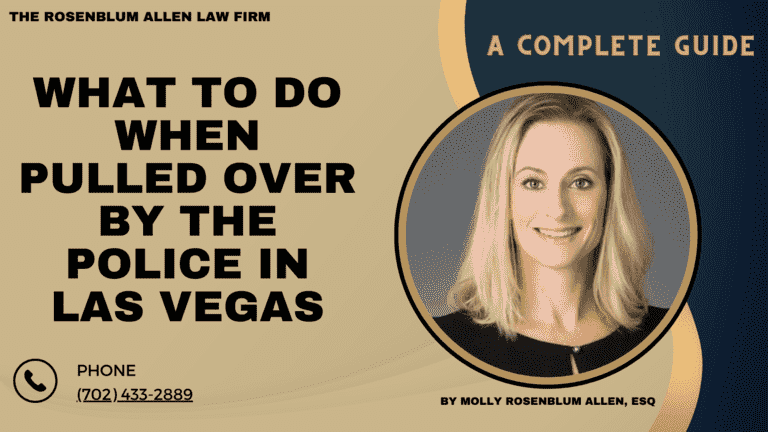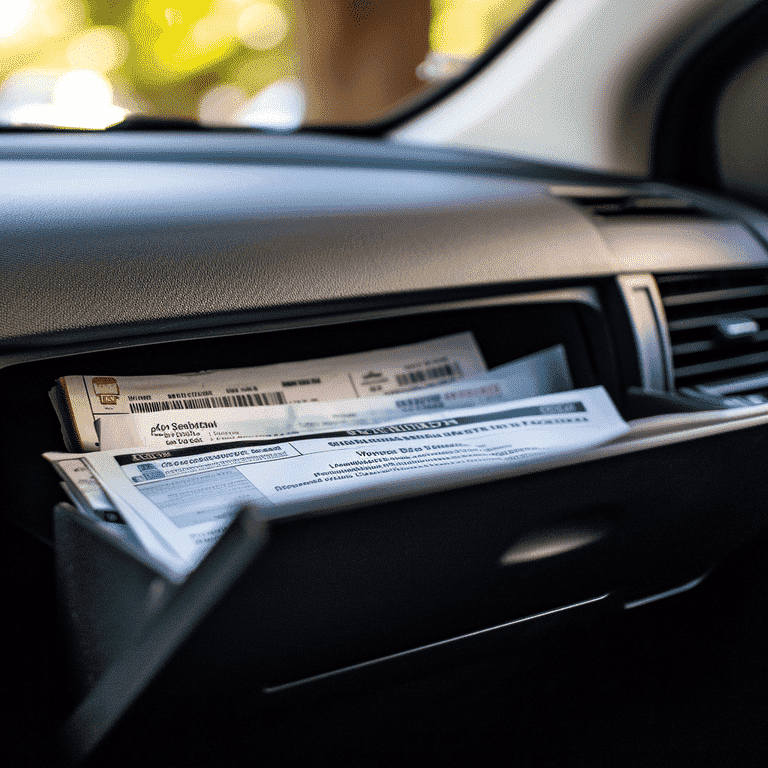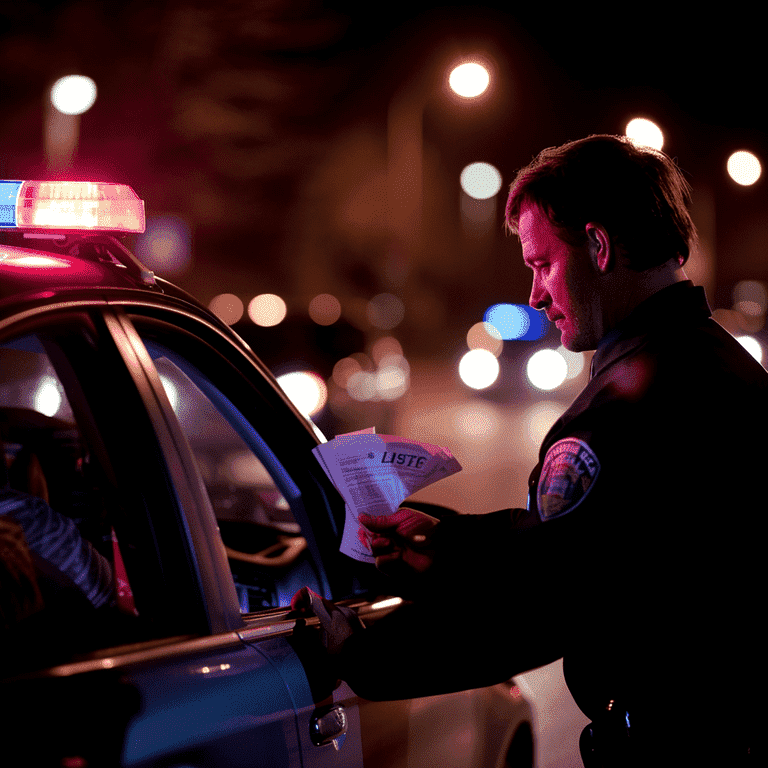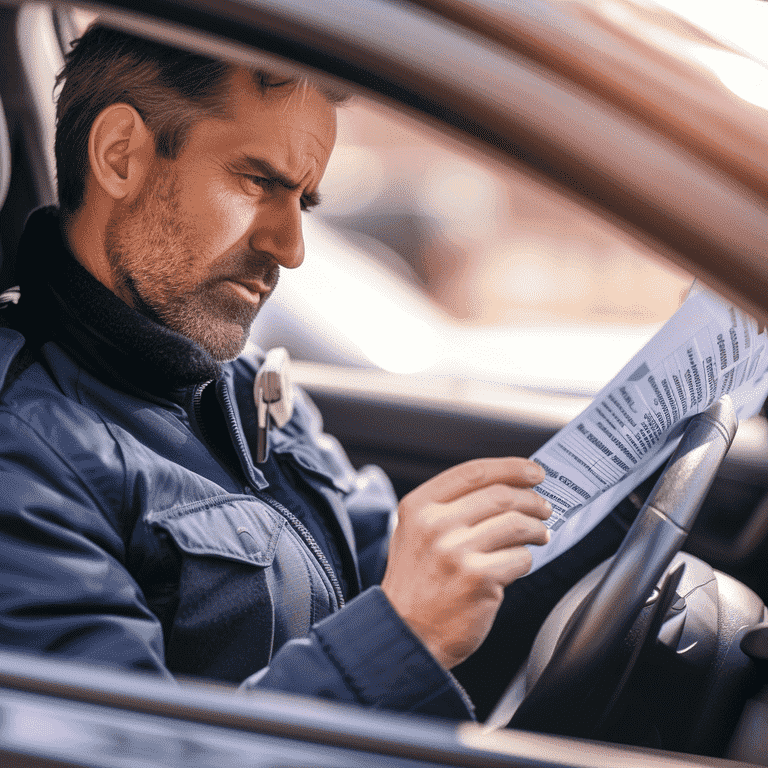Getting pulled over by the police can be nerve-wracking.
This is especially true in a bustling city like Las Vegas.
Whether you’re a resident or just visiting, knowing how to handle such encounters can significantly reduce stress.
It can also help protect your rights. This guide provides a comprehensive overview of what to do if you find yourself in this situation.
It covers understanding your rights and interacting with law enforcement officers.

Understanding Your Rights
To avoid unnecessary complications, you must be aware of your rights during a traffic stop. Here’s a breakdown of some fundamental rights you have when pulled over by the police in Las Vegas.
The Right to Remain Silent
You have the right to remain silent. You’re not obligated to answer potentially incriminating questions. Here’s how to exercise this right effectively:
-
Be Polite: Inform the officer that you choose to exercise your right to remain silent.
-
Stay Calm: Even if you decide not to speak, remaining calm and composed is critical.
The Right to Refuse Consent to Search Your Vehicle
Officers may ask for your permission to search your vehicle. Remember:
-
You Can Say No: Politely decline if you do not want your car searched. Unless they have probable cause, your refusal should be respected.
-
Know When They Can Search: If an officer believes they have probable cause, they might search your car without your consent.
The Right to Document the Encounter
Documenting the stop can be beneficial for both parties. Keep these tips in mind:
-
Inform the Officer: Let the officer know you will record, doing so in a non-confrontational manner.
-
Do It Safely: Make sure your actions don’t seem threatening. Keep your hands visible at all times.

Before Being Pulled Over
Preparation is key. Here are some tips on what to do before a traffic stop happens.
Keeping Necessary Documents Accessible
Ensure your driver’s license, registration, and proof of insurance are easily reachable. A glove compartment or dedicated holder can be helpful for this.
Recognizing Legitimate Police Officers
Impersonators can pose a significant risk. Here’s how to ensure you’re dealing with an actual officer:
-
Look for Marked Vehicles: Official police vehicles in Las Vegas are usually clearly marked.
-
Check for Identification: Don’t hesitate to ask for identification if something feels off. A legitimate officer won’t mind providing this.

During the Traffic Stop
When you notice the police signaling you to pull over, it’s important to respond appropriately.
Pulling Over Safely
-
Signal Your Intentions: Your turn signal indicates you’re pulling over.
-
Find a Safe Spot: Choose a well-lit area if possible, especially at night.
-
Turn Off Your Engine and Turn On Your Interior Light at Night: This action shows the officer that you’re not a threat and are taking the stop seriously.
Interacting with the Police Officer
A respectful and calm demeanor goes a long way during a traffic stop.
-
Greet the Officer Politely: A simple “Good evening, officer” sets a positive tone.
-
Keep Your Hands Visible: Place your hands on the steering wheel to reassure the officer of your intentions.
-
Be Honest, But Careful: While being honest is good, remember your right to remain silent on potentially incriminating questions.
Complying with Lawful Orders
Understanding what constitutes a lawful order during a traffic stop is crucial.
-
Follow Simple Instructions, Such as providing your documents or stepping out of the vehicle if asked.
-
Know Your Boundaries: While you should comply with direct orders, you also have rights that protect you from unreasonable requests.
Each section aims to help you navigate the potentially stressful experience of the police pulling you over in Las Vegas. You can do it with confidence and peace of mind. Stay informed and prepared is your best defense in any traffic stop situation.

After Receiving a Citation or Warning
Once the officer has concluded the traffic stop, you might receive a citation or a warning. Here’s how to handle this situation.
Reviewing the Citation or Warning
Take a moment to review carefully any citation or warning issued by the officer. Here’s what to look for:
-
Accuracy of Information: Ensure your details and the details of the alleged offense are correctly listed.
-
Instructions for Next Steps: Citations usually include information on how to pay the fine or contest the charge in court. Make sure you understand what’s required.
Considering Your Next Steps
Deciding what to do after receiving a citation is crucial. Here are your options:
-
Paying the Fine: If you choose to pay the fine, follow the instructions provided in the citation.
-
Contesting the Citation: If you believe the citation was unjustly issued, consider contesting it in court.

Legal Representation in Las Vegas
If you decide to contest a citation or are facing charges with legal consequences, seeking legal representation is a wise choice.
Finding a Qualified Defense Attorney
Not all attorneys are equal, especially in Las Vegas. This is especially true when handling traffic citations or more severe charges. Here’s how to find a good one:
-
Research: Look for attorneys specializing in traffic law or the specific charges you’re facing.
-
Reviews and Recommendations: Check online reviews and ask for recommendations from trusted people.
-
Consultations: Many attorneys offer free consultations. Use these meetings to gauge whether the attorney is a good fit for you.
The Benefits of Legal Representation
Having an experienced defense attorney can significantly impact the outcome of your case. Here are some benefits:
-
Effective Guidance: An attorney can navigate the legal system more effectively than you can.
-
Negotiation Skills: Attorneys can often negotiate lesser charges or penalties.
-
Peace of Mind: Knowing you have a professional advocating can ease stress.
Why You Have Not Hired a Felony Defense Attorney Yet
Watch this short video to take the next big step toward defending your rights against a felony charge.

Breaking It All Down
Getting pulled over by the police in Las Vegas can be a daunting experience. But, understanding your rights and knowing how to behave can make a big difference.
If you end up with a citation or warning, take the time to review it and consider your options carefully.
If you decide to contest the charge, finding a qualified defense attorney in Las Vegas can provide you with the expertise and representation you need to navigate the legal process.
Remember, the best strategy is to stay informed and prepared. This will help you confidently handle any traffic stop.

Frequently Asked Questions
Can the police pull me over without any reason?
Police officers need a legitimate reason, “reasonable suspicion,” to pull you over. This could include traffic violations, equipment failures, or erratic driving behavior.
What should I do if asked to step out of my car?
If an officer requests that you step out of your vehicle, it’s within their rights to do so for safety reasons. Comply calmly, ensuring your hands are visible at all times.
Can I ask the officer why I was pulled over?
Yes, you can politely ask the officer the reason for the stop if they have not already informed you. It’s important to remain respectful and calm during this exchange.
What if I’m stopped by an unmarked police car?
If you’re unsure about an unmarked car pulling you over, call 911 to verify the traffic stop. Drive slowly to a well-lit, public area before stopping if you’re concerned for your safety.
Can I refuse to take a sobriety test in Las Vegas?
Refusing a sobriety test, such as a breathalyzer, can have legal consequences. These include license suspension and fines because Nevada has implied consent laws. But, you have the right to refuse until you’re formally arrested.
How can I file a complaint if my rights were violated during a stop?
You can file a complaint with the police department’s internal affairs division. Or, you can seek help from a civil rights organization. Documenting the incident in detail will be crucial for your complaint.
Do I need to hand over my phone if I recorded the traffic stop?
No, you are not required to hand over your personal property, including your phone. You only have to do so if there is a warrant or clear evidence of a crime. Always back up such recordings as soon as possible.
What happens if I’m out of state and get pulled over in Las Vegas?
Out-of-state drivers are subject to the same laws as Nevada residents. If you receive a citation, you can pay the fine or contest it. Be aware that failing to respond can lead to extra penalties.
Can the police search my car if they smell marijuana?
Yes, authorities can consider the smell of marijuana as probable cause to conduct a search without your consent. Nevada’s legalization of marijuana for recreational use includes strict public consumption laws.
What should I do with a weapon in my vehicle during a traffic stop?
If you have a firearm in your vehicle, inform the officer when it’s safe. Follow their instructions carefully, and ensure the weapon is legally possessed and stored.

Glossary
Reasonable Suspicion: A legal standard that allows police to stop and briefly detain a person if they have a justifiable reason to suspect they’re involved in criminal activity. This is less than probable cause but more than a mere hunch.
Probable Cause: A reasonable basis for believing that a crime may have been committed, which is required for police to make an arrest, conduct a search, or receive a warrant.
Implied Consent Laws: Laws that presume a driver has consented to submit to chemical tests (like a breathalyzer) for the presence of alcohol or drugs in their bloodstream by the mere act of driving. Refusal to comply can result in penalties.
Sobriety Tests: Tests used by law enforcement to determine if a driver is under the influence of alcohol or drugs. These can include field sobriety tests (physical or cognitive) and chemical tests (like breath, blood, or urine).
Citation: A notice issued by law enforcement to an individual accusing them of violating a law, typically traffic laws. It often requires the payment of a fine or an appearance in court.
Internal Affairs: A division within a police department that investigates complaints and misconduct allegations against officers.
Civil Rights Organization: An organization that advocates for protecting and expanding individuals’ rights and freedoms guaranteed by law, especially for those who may face discrimination or injustice.
Probable Cause for Search: The legal standard must be met before law enforcement can search personal property, such as a vehicle, without the owner’s consent. It requires a reasonable belief that evidence of a crime will be found.
Public Consumption Laws: Laws that regulate or prohibit the consumption of certain substances, such as alcohol or marijuana, in public spaces.
Firearm Disclosure: Informing law enforcement that you have a weapon in your vehicle during a traffic stop. This is usually required for safety reasons and to avoid misunderstandings.

Additional Resources for You
Our lead attorney, Molly Rosenblum, Esq., has compiled a wealth of resources to assist you during challenging legal situations. Whether you’re facing a complex legal matter or seeking to understand your rights, the following articles may provide valuable guidance:
-
Double Jeopardy: Understanding the protections against being tried twice for the same offense is crucial. Read more at Double Jeopardy to learn the intricacies of this legal principle.
-
Hung Jury: Discover what happens when a jury cannot reach a unanimous decision and how it impacts a legal case in Nevada at Hung Jury.
-
Circumstantial Evidence: Learn about how indirect evidence can influence your case by visiting Circumstantial Evidence.
-
Indicted vs Charged: Gain clarity on the difference between being indicted and being charged in the state of Nevada. A detailed explanation is available at Indicted vs Charged.
-
Difference Between Jail and Prison: For information on the distinctions between jail and prison, including duration of stay and types of offenses, check out Difference Between Jail and Prison.
-
What are Miranda Rights: Know your rights upon arrest and the significance of Miranda warnings. Detailed information can be found at What are Miranda Rights.
-
How to Check if You Have an Outstanding Warrant: Discover the steps you need to take to find out if there is an outstanding warrant for your arrest by visiting How to Check if You Have an Outstanding Warrant.
-
What to Look for in a Criminal Defense Lawyer: Make an informed choice when selecting legal representation by reading What to Look for in a Criminal Defense Lawyer.
-
Possible Ways to Reduce a Felony Charge: Explore your options and legal strategies that might reduce a felony charge by visiting Possible Ways to Reduce a Felony Charge.
-
Should You Accept a Plea Bargain?: Before deciding whether to accept a plea deal, consider the information provided at Should You Accept a Plea Bargain.
These resources created by Molly Rosenblum, Esq., are designed to empower you with knowledge and assist you in your time of need. Don’t hesitate to reach out for personalized legal advice tailored to your specific circumstances.

Outside Resources for You
-
American Civil Liberties Union (ACLU): Offers extensive resources on civil liberties, including how to interact with law enforcement. ACLU
-
National Association of Criminal Defense Lawyers (NACDL): Provides resources and information for those seeking legal defense and advocacy. NACDL
- National Highway Traffic Safety Administration (NHTSA): Offers information on traffic safety, including tips for safe driving and what to do during traffic stops. NHTSA
-
FindLaw: A comprehensive legal website providing free legal information and resources on a wide range of topics, including traffic laws. FindLaw
-
Southern Poverty Law Center (SPLC): Focuses on fighting hate and bigotry and seeking justice for the most vulnerable members of society, with resources on civil rights. SPLC
-
Electronic Frontier Foundation (EFF): Offers information on digital privacy, including your rights when recording police encounters. EFF

A Special Message for You from Our Lead Attorney, Molly Rosenblum Allen, Esq

Dear Reader,
Thank you for reviewing our comprehensive guide on what to do when pulled over by the police in Las Vegas. We hope you found the information insightful and empowering. It should provide you with the knowledge to navigate these situations .
At The Rosenblum Allen Law Firm, we understand that encountering law enforcement can be stressful. It can also lead to complex legal challenges. That’s why we’re here to offer our expertise and support. We’re ready to assist if you have specific questions about your rights. We can also help with advice on handling a citation or provide legal representation.
I invite you to take advantage of a free consultation with our team. Please call us at (702) 433-2889 to schedule your appointment. We commit to providing you with personalized advice. We will explore the best legal options available to you.
Thank you again for your trust in our resources. We look forward to the opportunity to serve you.
Warmest regards,
Molly Rosenblum Allen, Esq.


